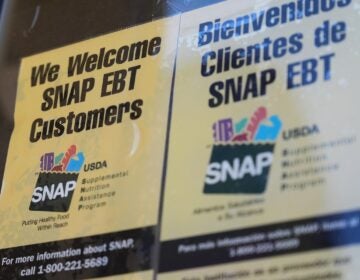States scramble to prepare ahead of food stamps rule change
From Hawaii to Pennsylvania, states are scrambling to blunt the impact, with roughly 700,000 people at risk of losing benefits unless they meet certain work requirements.

In this Thursday, Feb. 27, 2020, photo, Richard Butler and his fiancé Amber laugh while they have breakfast in an apartment a friend is letting them live in on Chicago’s Southside. (Charles Rex Arbogast/AP Photo)
Having food stamps offers Richard Butler stability he’s barely known in his 25 years. He was in state custody at age 2, spent his teen years at a Chicago boys’ home and jail for burglary, and has since struggled to find a permanent home.
The $194 deposited monthly on his benefits card buys fresh produce and meat.
“It means the world to me,” said Butler, who shares a one-bedroom apartment with two others. “We can go without a lot of things, like phones and music. We can’t go without eating.”
But that stability is being threatened for people like Butler, who are able-bodied, without dependents and between the ages 18 and 49. New Trump administration rules taking effect April 1 put hundreds of thousands of people in his situation at risk of losing their benefits. They hit particularly hard in places like Illinois, which also has been dealing with a separate, similar change in the nation’s third-largest city.
From Hawaii to Pennsylvania, states are scrambling to blunt the impact, with roughly 700,000 people at risk of losing benefits unless they meet certain work, training or school requirements. They’ve filed a multi-state lawsuit, expanded publicly funded job training, developed pilot programs and doubled down efforts to reach vulnerable communities, including the homeless, rural residents and people of color.
Social service agencies say they won’t be able to fill the gap, making increased homelessness and more hospital visits among the biggest concerns. Experts say they’ve already seen troubling signs in some states.
“This is a cascading effect,” said Robert Campbell, managing director at Feeding America, which runs hundreds of food banks nationwide. “It will increase demands on the emergency food system, food banks and pantries.”
Currently, work-eligible, able-bodied adults without dependents under 50 can receive monthly benefits if they meet a 20-hour weekly work, job training or school requirement. Those who don’t are are limited to three months of food stamps over three years.
However, states with high unemployment or few jobs have been able to waive time limits. Every state except Delaware has sought a waiver at some point, according to the National Conference of State Legislatures.
The new rules make it harder to get waivers. They’re the first of three changes to the Supplemental Nutrition Assistance Program, or SNAP, which feeds 36 million people nationwide.
The Trump administration has touted the change as a way to get people working and save $5.5 billion over five years. Able-bodied adults without dependents are 7% of SNAP recipients.
But states fighting the change say that argument is misguided.
“Not everyone is in a position to get a job tomorrow, and taking away access to food is only going to make that more difficult,” said Pennsylvania Department of Human Services Secretary Teresa Miller. “We’re going to have more hungry people in the state.”
Pennsylvania — where as many as 100,000 people could be affected — is working with social services groups to create 30 job training programs for SNAP recipients.
However, experts say work opportunities are limited.
More than half of SNAP recipients have a high school diploma, but about one-quarter have less, according to the Center on Budget and Policy Priorities. Available jobs are more likely to have low pay, shifting schedules that might not offer enough qualifying hours and few benefits like paid sick leave.
“Work requirements really don’t really do much to affect the rate at which people are working,” said Elaine Waxman at the Urban Institute, a nonprofit research organization. “If people can work and consistently, they pretty much are.”
Some states are focusing on rural areas, which have less access to transportation and services.
Hawaii, for instance, wants to develop a pilot program to help 400 Molokai residents keep benefits. The rural island once had a waiver because of high unemployment, but the new rules assign Molokai to the same job market as nearby, more prosperous Maui, even though a 30-minute plane ride is the only way to travel between the islands.
The program would use education, training and volunteering to fulfill the work requirement. It’s modeled after similar programs used in remote Alaska, which is seeking waivers for less-populated areas. Roughly 5,000 in Alaska could lose benefits.
Attorneys general in nearly 20 states and Washington, D.C., have sued to block the rules. They argue the changes will force people to divert their limited funds, leading to homelessness and health problems.
People with food insecurity spend 45% more on medical care annually than those who are food secure, according to a 2018 report by the nonprofit Center on Budget and Policy Priorities.
Experts say critics’ worries are founded and point to Kentucky as a case study.
Like a handful of states, Kentucky has voluntarily instated time limits for SNAP benefits since 2017. More than 13,000 people in Kentucky lost benefits because they reached the three-month limit, according to a 2019 Urban Institute report.
Anecdotally, there’s been an increase in food pantry visits.
In Fayette County, which lost its waiver in 2018, the average number of monthly household visits to food pantries jumped from 1,800 to 2,000, according to Michael Halligan, CEO of God’s Pantry Food Bank in Lexington.
“Starving people does not help them get employment,” said Mary Frances Charlton, a Chicago Coalition for the Homeless attorney.
It’s a double whammy for Illinois as Cook County lost its waiver this year because of low unemployment, something that has happened in other states as economic conditions improve. Roughly 90,000 statewide will be affected by the Trump rule change at the same time another approximately 58,000 will risk losing benefits in the Chicago area.
For Charlton, it’s been worrisome as many of her clients lack access to mail and internet, and they might not find out until they go grocery shopping and discover a $0 balance on their Illinois Link cards. She’s working to get exemptions for as many as possible.
For instance, Butler may qualify because of mental health issues that have made it difficult for him to keep a job. He’s among the residents affected by the county change but would have faced the same fate under the Trump administration rules.
In trying to deal with the volume of questions about the issue, Illinois has dedicated an email address just for the food stamps changes and hopes to add more job training.
Inspiration Corporation, a nonprofit, runs a training kitchen and restaurant out of a converted Chicago warehouse. It has proposed increasing its number of spots for SNAP participants from 35 to 45.

On a recent day, fractions used in measuring were scrawled on a whiteboard near the kitchen, which serves Southern-inspired fare like grits.
Trainee Anthony Redmond, 44, started receiving food stamps when he was released from prison last summer. With the help, he was able to leave a halfway house and find his own place. After the training, he hopes to find employment and keep his benefits.
He dreams of opening a fleet of food trucks.
“If you take something that a person really needs and depends on and they don’t have any other life skills to get a job, to benefit their family,” he said, “it’s just going to cause trouble.”
Associated Press writers Audrey McAvoy in Honolulu and Becky Bohrer in Juneau, Alaska, contributed to this report.
WHYY is your source for fact-based, in-depth journalism and information. As a nonprofit organization, we rely on financial support from readers like you. Please give today.




